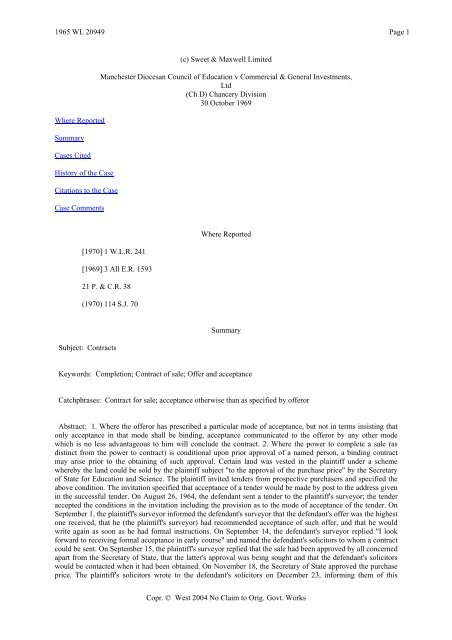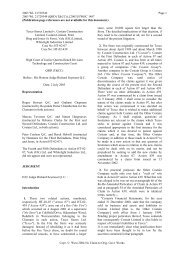Manchester Diocesan v Commercial - Thomson Reuters
Manchester Diocesan v Commercial - Thomson Reuters
Manchester Diocesan v Commercial - Thomson Reuters
You also want an ePaper? Increase the reach of your titles
YUMPU automatically turns print PDFs into web optimized ePapers that Google loves.
1965 WL 20949 Page 1<br />
Where Reported<br />
Summary<br />
Cases Cited<br />
History of the Case<br />
Citations to the Case<br />
Case Comments<br />
(c) Sweet & Maxwell Limited<br />
<strong>Manchester</strong> <strong>Diocesan</strong> Council of Education v <strong>Commercial</strong> & General Investments,<br />
Ltd<br />
(Ch D) Chancery Division<br />
30 October 1969<br />
Where Reported<br />
[1970] 1 W.L.R. 241<br />
[1969] 3 All E.R. 1593<br />
21 P. & C.R. 38<br />
(1970) 114 S.J. 70<br />
Subject: Contracts<br />
Summary<br />
Keywords: Completion; Contract of sale; Offer and acceptance<br />
Catchphrases: Contract for sale; acceptance otherwise than as specified by offeror<br />
Abstract: 1. Where the offeror has prescribed a particular mode of acceptance, but not in terms insisting that<br />
only acceptance in that mode shall be binding, acceptance communicated to the offeror by any other mode<br />
which is no less advantageous to him will conclude the contract. 2. Where the power to complete a sale (as<br />
distinct from the power to contract) is conditional upon prior approval of a named person, a binding contract<br />
may arise prior to the obtaining of such approval. Certain land was vested in the plaintiff under a scheme<br />
whereby the land could be sold by the plaintiff subject "to the approval of the purchase price" by the Secretary<br />
of State for Education and Science. The plaintiff invited tenders from prospective purchasers and specified the<br />
above condition. The invitation specified that acceptance of a tender would be made by post to the address given<br />
in the successful tender. On August 26, 1964, the defendant sent a tender to the plaintiff's surveyor; the tender<br />
accepted the conditions in the invitation including the provision as to the mode of acceptance of the tender. On<br />
September 1, the plaintiff's surveyor informed the defendant's surveyor that the defendant's offer was the highest<br />
one received, that he (the plaintiff's surveyor) had recommended acceptance of such offer, and that he would<br />
write again as soon as he had formal instructions. On September 14, the defendant's surveyor replied "I look<br />
forward to receiving formal acceptance in early course" and named the defendant's solicitors to whom a contract<br />
could be sent. On September 15, the plaintiff's surveyor replied that the sale had been approved by all concerned<br />
apart from the Secretary of State, that the latter's approval was being sought and that the defendant's solicitors<br />
would be contacted when it had been obtained. On November 18, the Secretary of State approved the purchase<br />
price. The plaintiff's solicitors wrote to the defendant's solicitors on December 23, informing them of this<br />
Copr. © West 2004 No Claim to Orig. Govt. Works
1965 WL 20949 Page 2<br />
approval and stating "... we conclude that the contract is therefore binding on both parties. Kindly confirm." The<br />
defendant's solicitors replied denying the existence of a contract. On January 7, 1965, the plaintiffs wrote to the<br />
defendant formally accepting the offer.<br />
Summary: Held, (1) that in the context of the earlier letters the letter dated September 15, was an acceptance<br />
of the defendant's offer notwithstanding that it was not in accordance with the mode of acceptance specified; (2)<br />
that the Secretary of State's approval as to the purchase price was required for the power of completion not for<br />
the conclusion of a contract; (3) that a contract was therefore concluded on September 15; or (alternatively to<br />
(3))(4) that the offer had neither lapsed nor been refused before January 7, 1965, when it was formally accepted<br />
and a contract formed. (Tinn v. Hoffman (1873) 29 L.T. 271 applied; Ramsgate Victoria Hotel Co v. Montefiore<br />
(1866) L.R. 1 Exch. 109 considered and Re Bowron, Bailey & Co (1868) 3 Ch.App. 592 considered).<br />
Judge: Buckley, J.<br />
Cases Cited<br />
Bowron Baily & Co Ex p. Baily, Re, (1867-68) L.R. 3 Ch. App. 592 (CA in Chancery)<br />
Ramsgate Victoria Hotel Co Ltd v Montefiore, (1865-66) L.R. 1 Ex. 109 (Ex Ct)<br />
Tinn v Hoffman, (1873) 29 L.T. 271<br />
History of the Case<br />
Negative Indirect History<br />
Distinguished by<br />
Yates Building Co Ltd v RJ Pulleyn & Sons (York) Ltd, (1973) 229 E.G. 1597 (Ch D)<br />
Applied by<br />
Citations to the Case<br />
(CA)<br />
Yates Building Co Ltd v RJ Pulleyn & Sons (York) Ltd, (1975) 237 E.G. 183; (1975) 119 S.J. 370<br />
Case Comments<br />
Contracts; EC law; Electronic commerce; Malaysia; United States. Electronic contract in the Malaysian<br />
Contracts Act 1950: an analytical comparison with the EU... Bus. L.R. 2003, 24(4), 91-106<br />
END OF DOCUMENT<br />
Copr. © West 2004 No Claim to Orig. Govt. Works

















